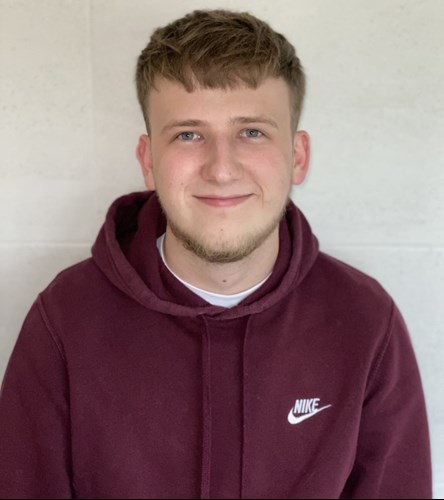For this year’s Mental Health Awareness Week, UCFB student Tommy Wilson has bravely come forward to discuss his mental health in an attempt to break the stigma connected to it. Here, the BA (Hons) Football Coaching & Management student opens up about his own personal struggles, and how he’s learned to manage and control these over the years…

Mental health is still a topic that is hindered by stigma. Not necessarily shunned by society, but it is certainly something you don’t hear about often enough. It’s not something people mention freely, but that shouldn’t be the case. I want to open up to you all in this open blog to show that you don’t need to let your mental health set you back. There is a way out, or a way of learning to live with it, which is something I’ve done. Since I was 15, I’ve been managing depression and anxiety. I use the term ‘managing’ as over the years I’ve learnt to live with the highs and lows of mental health, having found my way of coping with the issues I face.
Let’s take it back to when I was 15. I was going through my final year of GCSEs at a boarding school, constantly being reminded as to how important these exams were, pressure piling up, but I became distracted by my mental health. I started to lose the desire to express myself, I found myself closing-up in my room on my own, shutting off emotionally and physically. These were foreign emotions to me and they gradually developed. I found myself becoming more and more disconnected from my environment. It was tough. It started to affect me on a day-to-day basis, but I didn’t want anybody to know how I was feeling. I wanted to keep it to myself and deal with it on my own. Back then there wasn’t much awareness about mental health, especially men’s mental health and depression, so when I was diagnosed with depression and anxiety it was a real shock to the system. I felt alone. I didn’t apply myself; I couldn’t bring myself to study, and this did affect my GCSE grades.
This continued into my A-Levels. I found my mind to be fluctuating between overactive thoughts and restlessness to feeling flat and physically exhausted. I was entering an emotionally tender period. It made me question who I was; I was a completely different person to the year prior. What had changed? The only place I wanted to be was in my bedroom on my own, it was my safe place. What I’ve learnt over the years is that you find strength in those around you. My Head of House at school is someone I’ve maintained contact with over the years. The support and selfless actions kept me going and he did everything he could to look after me. Ultimately, I couldn’t beat it, and ended up dropping out of Year 12 with nothing to show for it. I didn’t know what I was going to achieve with no A-Levels and GCSEs that didn’t reflect my true ability. I felt lost.
“It starts with giving young people the courage and confidence to speak out” 🗣@AndyBurnhamGM on the importance of prioritising young people’s #mentalhealth pic.twitter.com/sTt1BaJILq
— UCFB | GIS (@ucfb) May 10, 2021
From the age of 18 to 22 I was working in IT at a private school. I worked hard to achieve Level 3 and Level 4 apprenticeships and I really felt I had found my feet. I loved the job; I enjoyed the workplace and the people I worked with were great. My mental health changed over these years; the ‘down days’ weren’t as frequent but I found they were a lot darker. I could have two weeks of feeling motivated and positive then have two to three days of feeling my lowest. This darkness allowed suicidal thoughts to seep in but I never allowed it to get the better of me. It did become a tiring battle. It would eventually start to affect me at work and that would lead to more problems. There was one day where things could’ve gone very wrong, but I’m grateful I got myself out of that mindset otherwise things would’ve been very different.
That particular day was a wake-up call. I had the idea to start writing a book about mental health, how it has affected me and how I can try and make a difference. I want to help others going through similar mental health issues. That’s when it turned around for me. I was trying to turn my negative experiences into a positive outcome, my feelings and emotional experiences to be a lesson to doubters and help those going through it to get out the other side. I completed a Mental Health First Aid course to get a greater understanding and learn methods of helping others, something that helped me understand more about myself too.
My manager at the time kept my head in the right place. He gave me the platform to express myself and we would often talk both inside and outside of work about what I was going through. He could relate and that was important, he didn’t shut down my feelings. Instead he could understand and help me out when I was feeling low at work. I learnt a lot from him, and our shared passion for football was a daily topic. He was proud when I told him I was applying for university and the entire workplace was happy for me. Having these people around me every day gave me a purpose, it helped me get my life back on track and it made me who I am today.
My love for football has been constant throughout my life. Years of Football Manager has fed this addiction, as was going to Norwich City games whenever I possibly could, eventually owning a season ticket and taking in the passion every week. It’s been a huge part of my life, something I’ve always wanted to be involved in. Applying for UCFB meant that I had a route into the game. I knew that it was the right time to apply and I decided to drop everything to pursue this dream.
What I’ve learnt throughout the past eight years of my life is that I cannot completely eliminate those feelings. I’ve found that learning to live with them and accepting them as part of who I am has helped me regain full control of my life. Some days can be tough, but I know what to try to get out of it, and my own methods of managing it. I had to work hard to get to where I am today, I had setbacks in my life that wouldn’t have allowed me to come to university, but I found my own path and I’m here to work hard and prove to my 15-year-old self that I can do it.
It’s okay not to feel okay. It’s important to remember that people go through different upbringings and different life events that affect the way they handle situations. Just because you feel a certain way or you are diagnosed with a mental health problem doesn’t make you abnormal. Everybody is different, it takes a life lesson to take in that you are your own self and you don’t need to rely on what society tells you to be. The stigma that surrounds depression, body image, anxiety, eating disorders – any mental health problem – is labelled in such a way that gives the impression of negativity. That needs to change. Take a few minutes to think about mental health. How do you see mental health? What does it mean to you?
Thank you.

















